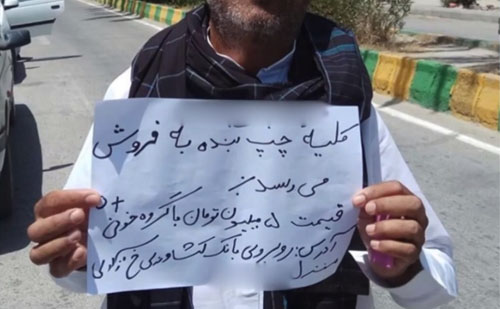by WorldTribune Staff, September 22, 2019
Responding to the U.S. troop build-up in the Gulf region, Iran’s foreign minister told CBS News that he was not confident that war could be avoided, while again denying Iranian involvement in the attacks on Saudi Arabia’s oil infrastructure.
In an interview with Face the Nation, Iranian Foreign Minister Mohammad Javad Zarif said: “I’m not confident that we can avoid a war. I’m confident we will not start one, but I’m confident that whoever starts one will not be the one who finishes it.”

While Iran’s leaders erect a tough-guy image on the international stage, at home the nation’s populace is struggling mightily, so much so that Iranians are resorting to selling their organs to get by economically.
“Amir, who is about 18 years old, has auctioned his kidneys due to poverty,” a report by the National Council of Resistance of Iran (NCRI) said. “He doesn’t want more than 500 million Rials. [5,000 dollars]. He says he can no longer cope with the landlord’s complaints. He and his brother have each decided to sell one of their kidneys and buy a small house with the help of a loan to relieve their mother of the suffering of not having a home.”
The selling of body parts has become “a measurement of Iran’s dismal economy,” Washington Times correspondent Rowan Scarborough noted in a Sept. 21 report.
NCRI, an anti-Iran dissident group based in Albania, said that organ-selling is on the upswing as younger Iranians are in a desperate search for cash in a job-scarce economy.
The NCRI’s report said organ sellers are writing offers on walls near hospitals or going on social media to attract bidders. Some are quoted in state-run newspapers.
“Many beg the pedestrians not to erase their announcements from the wall since they are desperate and need the money urgently,” says the council report, entitled “Selling Body Parts: A Tragedy in Iran.” “The sellers usually prefer to contact the prospective candidate directly to avoid giving a commission to the middlemen.”
The price list: kidney, up to $10,000; liver, up to $50,000; and a cornea $20,000.
Shahin Gobadi, a NCRI spokesman, provided The Washington Times with state-run news agency reports of Iranians willing to give up a cornea to survive financially.
The NCRI, which relies on a network of spies as well as Internet searches, says about 3,800 kidney transplants are performed each year in Iran. Of those, about 3,000 are products of a vibrant organ market.
“The kidney and liver markets are hot for brokers. Instagram and Telegram apps are among their preferred platforms,” the NCRI’s report says. “The middlemen have also set up websites where they ask sellers to sign up and leave their details for buyers to find. Both sides pay the broker’s commission.”
The report provided recent notices on a kidney sales web site:
“Omid: Selling healthy kidney, resident of Sannandaj [west Iran], blood type: O-”
“Rouzbeh: Male, 26 years old, willing to sell a kidney due to financial problems. Blood type: O+. Price: 600 million rials [$5,300].”
“In addition to functioning through the Internet, brokers often wander around major hospitals and approach relatives of patients who need a transplant in order to assess their financial status and make an offer an offer,” the NCRI said. “Brokers often take a 50 percent commission on resulting sales.”
The council quoted a health commission member: “Based on Sharia, organ transplant is not a problem and is permissible, and his holiness Imam [Khomeini] gave the authorization for and the grand clerics are not opposed to it.”
A World Bank report in April said it expects Iran’s economy to contract this year and next, while suffering through “stagflation” –– no growth and high inflation –– with the government running up record deficits.
Intelligence Brief __________ Replace The Media
